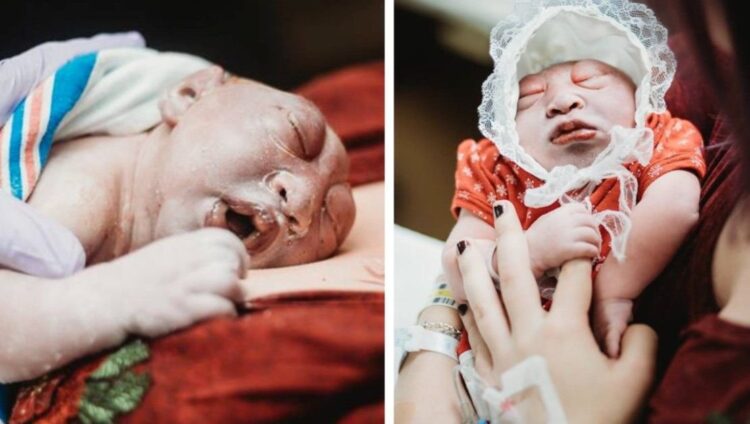Anencephaly is a rare neural-tube defect that occurs in one in 10,000 births in the United States. The chance for survival is extremely low. When one couple found out their child had this disorder, they decided to do everything they could to help other babies live longer.
‘Rainbow Baby’

The mom shared her story on CafeMom, and began they day they found out they would have what they called their “rainbow baby.”
Rylei Arcadia Diane Lovett

The pregnancy began precariously, but they made it through the first trimester OK. She was so excited to find out the gender. “After fighting with our stubborn child, we found out we were having a little girl!” she wrote. They named her Rylei Arcadia Diane Lovett.
Original Diagnosis Was Spina Bifida

When they later had additional testing done to find out whether the baby was developing as she should, they found out Rylei had a neural tube defect. Mom says they were at first told there was a one in five chance the baby might have spina bifida, and the parents got another opinion.
Rylei Had Fatal Disease

At 18 weeks and four days, the parents found out Rylei had anencephaly, a rare, fatal disorder in which the brain doesn’t develop properly. Sometimes on the brain stem develops. There is no cure, and the prognosis is almost always death soon after birth.
Life-Changing Decision

Doctors told them they had two options: Carry Rylei to term, or have labor induced. But later they found a third option: carry Rylei to term and have her organs donated. They chose to do that to help other babies who might live. “We wanted to give parents the option to take their babies home, even if we couldn’t,” she wrote.
They Thought Rylei Would Die At Birth

The mom wrote that the labor was terrible because her body just wasn’t ready to give birth. Soon after Rylei was born, they expected her life to end. They waited a half-hour to cut the cord. Then they waited some more.
Rylei Unexpectedly Discharged From Hospital

Rylei then was doing well for an entire 12 hours. “Her vitals were strong,” says mom. On Dec. 29, 2018, doctors said she could be discharged from the hospital. “She’s almost a whole week old and still holding strong. The doctors are shocked. We all are. We were not expecting this,” she wrote.
Family Had Precious Days Together

The family shared fun, precious times together. “She’s still eating like a champ and her personality is really starting to emerge. If you all could have only seen the mad face I got today when I cut skin-to-skin short because I had to pee. She was giving me the stink eye hardcore.”
Rylei Is Helping Others

But the inevitable arrived.
“After seven magical days, Rylei passed in our arms,” they wrote. But her valves and lungs went to other babies who had a chance to live. Her placenta was also donated for research into anencephaly. The family are taking comfort in the fact that Rylei will live on in others.
“There are going to be two kids who make it a lot longer because of her. If I wasn’t able to bring my baby home forever, at least others could.”
A Selfless Decision

What would be — and still is — a tragic occurrence has a very silver lining thanks to this mother’s decision. She did something that most likely wouldn’t do and it’s going to benefit the many as a result.
A good deed in a weary world.
Anencephaly

According to the CDC, Anencephaly is a birth defect where the baby is born without parts of the brain and skull.
As the neural tube forms and closes, it helps form the baby’s brain and skull (upper part of the neural tube), spinal cord, and back bones (lower part of the neural tube).
Anencephaly happens if the upper part of the neural tube does not close all the way. This often results in a baby being born without the front part of the brain (forebrain) and the thinking and coordinating part of the brain (cerebrum). The remaining parts of the brain are often not covered by bone or skin.
Common?

Around 1,206 pregnancies in the United States face this defect, or 3 in every 10,000 according to the CDC.
Lowering The Count

As the CDC notes, making sure you get enough folic acid before and during early pregnancy can help prevent these neural tube defects. We also have been battling these numbers as a nation by fortifying grains with folic acids.
No Cure

There is sadly no cure and most women become aware of the defect at birth, not like it was in the case of Rylei Arcadia. The testing before the pregnancy becomes ever more important due to this, leaving plenty of time for decision-making.

















































